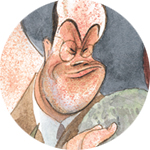 |
|
| Everybody's a critic
David Brooks, AB’83 The new kid on the New York Times op-ed roster has a reputation as a kinder, gentler conservative. David Brooks, who began his two-columns-a-week post in September, writes about politics and American culture. The latter is also the subject of his 2000 bestseller, Bobos in Paradise: The New Upper Class and How They Got There, in which “Bobos” is short for Bourgeois Bohemians, Brooks’s term for those educated elites whose hybrid of capitalist and hippie principles equate being good with making good. Education. On the way to a bachelor’s in history, Brooks wrote a dozen or so papers on Thucydides. Turning point. Brooks, who arrived at Chicago as a liberal, penned an April 5, 1983, Maroon column, “The Greatest Story Ever Told,” that purported to be a biography of conservative pundit and National Review editor William F. Buckley Jr., including this scene from a typical day in the patrician’s life: “In the afternoons he is in the habit of going into crowded rooms and making everybody else feel inferior. The evenings are reserved for extended bouts of name-dropping.” As collegiate parodies go, it was a success. When Buckley arrived on campus to give a talk entitled “Reflections on Current Disorders,” he asked if Brooks was in the lecture audience—he wanted to offer him a job. But the parodist was in California, preparing to meet another famously conservative thinker, Milton Friedman, AM’33, in a local public-television debate, taking a socialist position against the free-market economist. As Brooks recalled in the New York Observer, “The show was essentially me making a point, and he making a two-sentence rebuttal which totally devastated my point, and then me sitting there with my mouth hanging open, trying to think what to say. That didn’t immediately turn me into a conservative, but....” Venues. Brooks’s c. vitae includes brief stays at the National Review and the Washington Times as well as nine years at the Wall Street Journal (as op-ed editor, foreign correspondent, book review editor, and a fill-in stint as movie critic) and a similar tenure at the Weekly Standard, which he joined at its start in 1995. A contributing editor at Newsweek and the Atlantic Monthly, he makes regular appearances on National Public Radio and PBS’s News Hour with Jim Lehrer. He’s also written for the New Yorker, the New York Times Sunday Magazine, and the Washington Post. Generating ideas. “I carry notebooks around and observe how people behave,” Brooks told the Chicago Tribune. “I fill up notebooks and lay them out on the floor. Each pile is a paragraph. And I sit and I stream them all together. I have no memory. I have to write everything down. I’ve never had writer’s block. I can’t think without writing. I can’t think of what I believe in unless I write it down.” Sound bites. From a Times column on Lucky, the self-billed “Magazine about Shopping”: “It’s so peppy and chipper it makes going down the Hallmark card aisle in the drugstore feel like a trudge through Germanic philosophy.” On presidential hopeful Howard Dean: “Everybody talks about how the Internet has been key to his fund-raising and organization. Nobody talks about how it has shaped his persona. On the Internet, the long term doesn’t matter, as long as you are blunt and forceful at that moment. On the Internet, a new persona is just a click away.” Taking criticism. “Some people like you, and some definitely do not,” Brooks told the New York Observer. “If you take them all seriously, you get depressed, because there’s a lot of people who hate me—because not every reader of the New York Times is conservative. The worst stuff you don’t mind, because you know they’re crazy.” Short list. Backward and Upward: The New Conservative Writing, editor (Vintage, 1995); Bobos in Paradise: The New Upper Class and How They Got There (Simon & Schuster, 2000); On Paradise Drive: How We Choose to Live in a Rosier Future (Simon & Schuster, June 2004).
|
|
phone: 773/702-2163 | fax: 773/702-8836 | uchicago-magazine@uchicago.edu

